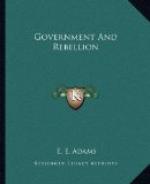turn back the wheel of improvement, and leave us at
the opening of 1776; estimate all the freedom of act,
of utterance, of industry; reckon the sum of human
comforts, even of luxuries, it has brought to our hand.
Look at all our ships, our mechanism, our homes, our
sanctuaries, our institutions of morality, of mercy
and of religion; our wealth, intelligence, order,
power; consider the elevation given to millions in
the worst form of civilization in the land, showing
that such is the vitalizing force of our national
life, that even slavery here, bad as it is—and
we know of nothing worse as a system—lifts
men above the natural license of savage existence.
Consider all this, and much more, that I may not stop
to utter, and you cannot—you
do
not—no sane mind
can question the
supreme excellence—I had almost said the
divine excellence—of our government.
And if there were need of other proof, we have only
to remind you with what promptness the call of our
noble Chief Magistrate was answered from every free
State—from the city and the hamlet; from
the bank, the bar, the press and the pulpit; from
the workshop and the soil; from the calm and comfort
of home and ease and affluence, and from the cottage
of the poor, as if the pulse of the government were
beating in every vein, and the will of the Cabinet
had its home in every bosom! Strong men, young
men, aged men, men of leisure, Christian men—all
ready to march under the stars and stripes, or to
pour out their treasure for others. Mothers and
wives and sisters, with breaking hearts and tremulous
benedictions, bidding the heroes go—offering
them on their country’s altar. Oh, it would
not be thus but for the true manhood which our government
infuses into loyal citizens. It would not be so,
but for the Christianity it protects without dictation,
and acknowledges without ostentation.
There may be criminal rebellion even against a wicked
and oppressive government. The people may take
the law into their own hands, and put to death, or
imprison their rulers, without first having
tried constitutional methods of redress. But
I speak of rebellion against good government—such
as we have already had in review. There is a difference
between insurrection and rebellion. The former
is an act of a people or population against a single
statute, or against a portion of the legislative enactments,
without necessarily growing into warfare, or revolt
against the whole constitution and the laws. This
may become rebellion. There is also a difference
between rebellion and revolution. The latter,
in a political sense, is a change, either wholly or
in part, of the constitution. This may be effected
by argument and a peaceful vote—by abdication,
by a change of national policy in view of some new
relation, and by general consent, or by warfare.
“The revolution in England in 1688, was occasioned
by the abdication of James II., the establishment
of the House of Orange on the throne, and the restoring
of the constitution to its primitive state.”




